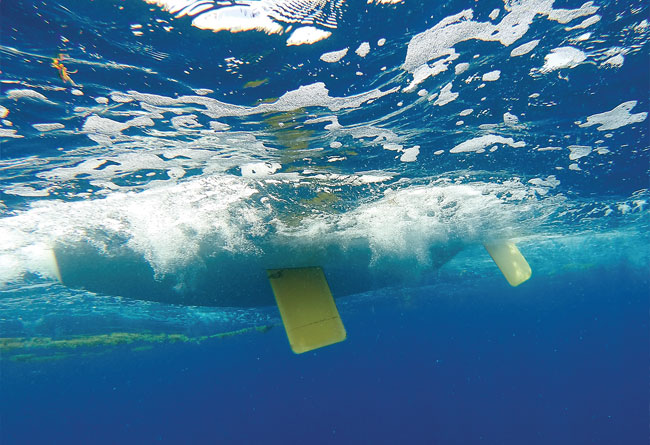

Every long journey still (sic) begins with the first step. This month Sailors for the Sea turn their attention to those annoying plastic drinking 'aids'
For centuries the enduring allure of tropical waters, trade winds and palm-fringed islands has enticed sailors to the Caribbean. The romantic notion of a pristine island paradise probably started with the stories brought back from the first Europeans to visit the Caribbean during the Age of Discovery. We’re in a different age now, one where man’s impact on the environment can be as big as nature’s; to preserve the notion of pristine paradise we need to work with, rather than against, nature. A balance must be met to reduce our impact on the environment so that nature as we know it may be preserved for future generations.
Sailors for the Sea’s Clean Regattas programme is designed to assist events and local communities to adopt standards and practices that will mitigate the effects of unsightly and environmentally unsafe refuse. The programme defines 25 best practices with guidelines on how to run any waterbased event in a sustainable way.
The scheme’s certification system employs a 75-point format, with three sustainability indicators given for each best practice. The indicators are broken down into five categories: event management, food and beverage, waste, venue and race management. The more points accrued the higher the level attained, ranging from participant level meeting just one best practice, up to the platinum level awarded to events meeting 70 of 75 indicators. It takes years for events to attain platinum level, so most start by choosing a few best practices to focus on, a few more being added each year to progress up the ladder.
In the Caribbean Antigua Sailing Week (ASW) provides a good example. Working with the Environmental Awareness Group of Antigua since 2009, ASW has added features each year, allowing it to climb the sustainability ladder to current silver status. In 2015, for example, they started a battle with straws with a nicely named Responsible Dinnerware programme encouraging regattas to eliminate all single-use plastics including straws.
The Caribbean is especially vulnerable to imbalance: the small size of island ecologies and limited recycling infrastructure make them very prone to harm from discarded trash.
Meanwhile, the fact that most land area is within a short distance of the sea makes for a higher than usual threat to the marine environment; the direct effects are seen on the very features that bring visitors and wealth to the local economies: refuse strewn on beaches; visible bleaching of coral reefs; habitat loss for fish and birds; reduced wildlife diversity; and threats from destructive invasive species… these are just some of the effects.
The simple plastic straw is routinely on the top-10 list for marine debris collected in every coastal clean-up. Plastic straws cannot be recycled but remain in prodigious use.
In the USA alone 500 million straws are used daily, many ending up in the oceans, with small fragments eventually finding their way into marine organisms and ultimately the food chain.
In Antigua the race organisers widely expanded the Responsible Dinnerware programme beyond the docks, with the Antigua & Barbuda Marine Association taking the mission even further, continuing the Skip the Straw initiative long after the regatta was over.
Local business owners swiftly opted in posting ‘Straws by Request Only’ signs. Many locals have seen the issue of plastic pollution washing up on their beaches over the years and know the negative impact plastic has on their environment. These signs create a catalyst for action and also create an amazing education moment for those who aren’t aware of the eight million tons of plastics that enter the ocean every year.
Clean Regattas have now registered over 1,000 events with over 400,000 sailors participating, making them the sailing world’s largest sustainability initiative. Just last year there were 216 regattas in 21 countries on four continents, with more expected in 2017.
The other notable events from the Caribbean that have been leaders in the programme include the BVI Spring Regatta and Sailing Festival, which regularly create blown glass awards made with used beer bottles from the year before; and the St Maarten Heineken Regatta, which last year banned all Styrofoam products. Both were participating in the programme for the ninth consecutive year. If you’re an organiser please consider joining this growing effort. And if you’re a sailor ask your events to join. It will yield tangible rewards…
Click here for more information on Sailors for the Sea »
We invite you to read on and find out for yourself why Seahorse is the most highly-rated source in the world for anyone who is serious about their racing.
To read on simply SIGN up NOW
Take advantage of our very best subscription offer or order a single copy of this issue of Seahorse.
Online at:
www.seahorse.co.uk/shop and use the code TECH20
Or for iPad simply download the Seahorse App at the iTunes store


